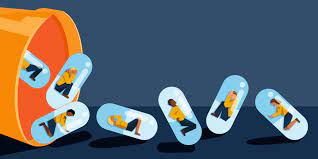Drug Dependency and Behavioral Addictions
May 06, 2023
This paper discusses drug dependency and behavioral addictions, exploring the causes of each type of addiction and how they manifest. Drug addiction is a complex disorder characterized by compulsive use of drugs in spite of negative consequences. It often manifests in changes to brain chemistry, resulting in physical dependence on drugs for everyday functioning. Behavioral addictions are similarly caused by changes to brain chemistry, and lead to compulsion towards certain activities or behaviors that can interfere with one's daily life and relationships.
The main cause of both types of addiction is believed to be an imbalance between reward-seeking behavior, impulse control, and decision making processes that arise from different parts of the brain. This imbalance leads to heightened seeking out or craving for drugs or activities associated with pleasure while simultaneously reducing the ability to resist such urges.
Environmental factors, such as stress or trauma, are also important contributors to both forms of addiction. Stress can lead to the release of hormones that alter brain chemistry in ways that make it easier for a person to become addicted, while traumatic experiences often lead to self-medication through drugs or activities associated with pleasure.

Drug and behavioral addictions manifest differently in individuals but some common signs and symptoms include: intense cravings; difficulty controlling use; spending large amounts of time obtaining, using, or recovering from use; neglecting other responsibilities in order to focus on substance/activity use; and developing tolerance (needing more drugs/more intense activity).
It is important to note that drug dependency and behavioral addictions are treatable conditions. It is possible to recover with the right professional help and support. Treatment typically involves therapy, lifestyle changes, medications, and in some cases, long-term residential treatment.
The ultimate goal of recovery is to lead a meaningful life free from drugs or activities associated with pleasure that interfere negatively in one's life. Recovery allows individuals to regain control over their lives and build healthier relationships with themselves, their families, and their communities. With hard work, determination, and adequate support it is possible for people struggling with addiction to achieve lasting recovery.
